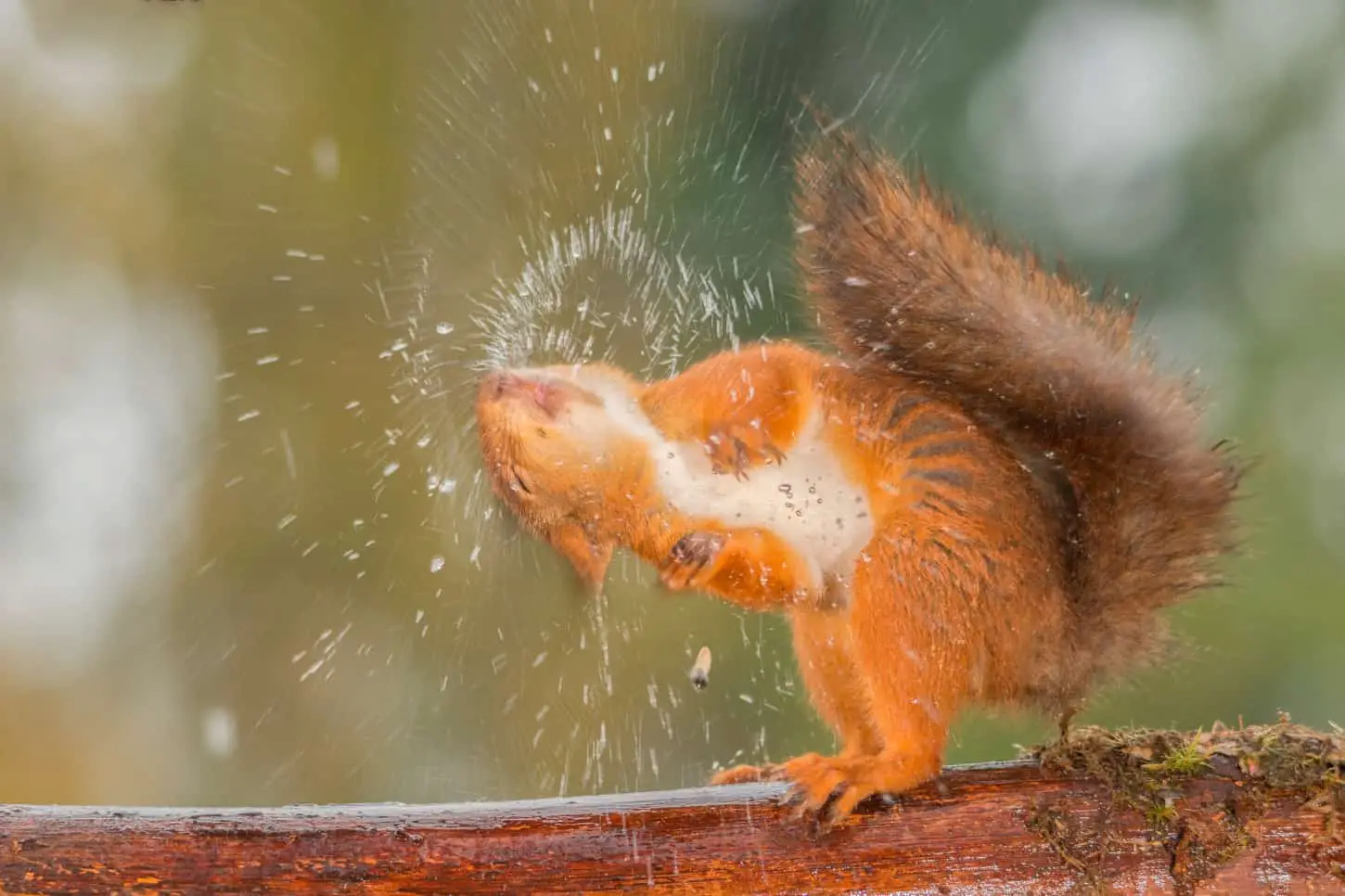Do you ever wonder if squirrels can swim? The answer is yes, they certainly can!
In fact, some species of squirrel are better swimmers than others.
They’re able to swim quickly and for long distances, and even underwater if need be.
Learn more about how well different types of squirrels can swim by reading on!
The Short Answer …
Squirrels can swim and in fact, they are good swimmers. Squirrels can swim across a river or a lake to look for new food sources and to escape from predators. Squirrels can hold their breaths underwater for up to 3 minutes.
Do Squirrels Like Water?
Although they are commonly perceived as being timid, squirrels are actually quite curious by nature.
They’re not afraid of venturing into new territory and will regularly put themselves in unfamiliar situations – even if it means getting wet.
There is some debate over whether or not squirrels enjoy taking baths.
Some people believe they do this to get rid of parasites while others think that the animals avoid water because their fur becomes matted after soakage.
Many people, on the other hand, have reported seeing squirrels playing in puddles and raindrops, indicating that they like the water.
It might ultimately come down to personal preference: some squirrels appear to despise water while others look to enjoy it.
Can Squirrels Swim?
Surprisingly, squirrels are phenomenal swimmers.
If a tree is situated by water and another is on the opposite side, the squirrel will swim to reach it.
In addition, if they’re being chased by predators, they have been known to jump into the water and swim to safety on the other bank of a river.
Furthermore, if necessary, they can hold their breath underwater for short intervals of time – again to avoid predators.
How Fast Can Squirrels Swim?

Squirrels are small, quick rodents noted for their dexterity and speed.
But how fast can they go on land? Squirrels travel at rates of up to 20 miles per hour (32 kilometers per hour).
They’re among the quickest animals in their weight class when terrestrial.
When in water, however, squirrels cannot reach such high speeds.
In water, squirrels swim at around 11 miles per hour (18 kilometers per hour).
This animal is well-known for its speed, especially in comparison to its tiny size.
In other words, squirrels are animals that know how to move quickly on land or in water.
How Far Can Squirrels Swim?
Squirrels are well known for being able to climb trees, but did you know that they are also competent swimmers?
Squirrels have been observed crossing rivers and lakes while migrating to new locations.
While most squirrels stick to the ground, those that live near water frequently take to the water.
Because of their hind legs and tails, squirrels are excellent swimmers. They paddle using their hind legs and rudder with their tails.
Squirrels have the advantage of being able to use their hind legs and tails as a propeller in water, making them more agile and efficient swimmers.
Their tails also help them with steering and maintaining balance while swimming; this is especially important since they are less graceful in the water than on land.
Can Squirrels Swim Underwater?
When squirrels feel threatened or are trying to get food from somewhere inaccessible, they can swim underwater.
Even though their legs and tails help them a lot, it’s still not an easy task to swim underwater for them.
If you watch a squirrel swimming, you’ll see that it doesn’t look relaxed at all – in fact, it looks like it is struggling to stay afloat and it might drown any second.
Can Squirrels Breathe Underwater?
Although squirrels are excellent swimmers, many people question if they can hold their breath underwater for a long time.
The answer is no; just as humans need oxygen to live, so do squirrels. They have lungs and must come up for air at regular intervals.
In fact, squirrels can go quite a long time without breathing. They can stay underwater for three minutes on average.
To prevent themselves from running out of air, they will come up to the surface every few minutes to take a breath while continuing to swim.
Can Baby Squirrels Swim?
It’s a common misconception that all animals are born knowing how to swim.
In reality, most animals have to learn how to swim, and this process often begins when they are very young.
Baby squirrels are no exception. While they are born with the instinct to hold their breath underwater, they still need to learn how to use their limbs to move through the water.
This process usually begins when the baby squirrels are around two months old.
They will start by plunging into shallow water and then gradually work their way up to deeper depths.
By the time they are adults, squirrels will be able to swim long distances across a river or lake.
However, it’s important to note that not all baby squirrels will survive the learning process. Some will drown before they have a chance to master the skill of swimming.
Can Red Squirrels Swim?
Red squirrels are actually quite good swimmers.
Like most tree squirrels, they use a doggy paddle stroke to move through the water.
Their tails also help to propel them forward and act as a rudder, allowing them to make quick turns.
In addition, their dense fur coat helps to keep them warm in cold water.
Besides red squirrels, other tree squirrels such as gray and fox squirrels are also quite good swimmers.
So next time you see a red squirrel scurrying up a tree, remember that they’re not afraid to take a dip every now and then.
Can Ground Squirrels Swim?
Ground squirrels are not as good swimmers as their tree squirrel relatives, but they can swim when they must.
This is due to their thick coat of fur, which aids in buoyancy.
However, they do not actually swim; instead, they float from one side to the other.
Ground squirrels will only cross water if there is no alternative route available to get where they want to go.
Ground squirrels are more likely to try and cross during summer months because the water is warmer.
Although ground squirrels can swim, it’s something they rarely do or don’t do very well.
Can Flying Squirrels Swim?
Although flying squirrels are exceptional gliders, they do not all excel in swimming.
Let’s take flying squirrels for instance. These animals generally like to stay airborne and travel by gliding on a membrane from one tree to another.
But the same membrane gets entangled easily, which noticeably retards their movement when they swim.
Furthermore, shorter legs on flying squirrels in comparison to other squirrel types hampers their ability to create the force required to swim long distances.
As a result, while they may be able to paddle around in the water for a short period of time, they are not strong swimmers.
Can Squirrels Drown In The Pool?
You’re outside by the pool on a scorching summer’s day attempting to soak up some rays. You pass a small rodent and see it dive into the water all of a sudden. It’s a squirrel!
But can these animals swim, or will they drown in the pool?
Squirrels are excellent swimmers who may be seen paddling across lakes and streams.
They are not, however, suited for diving into deep water.
Because they lack anything to hang on to in the pool, they will soon grow weary and sink to the bottom of the pool.
So, if you see a squirrel taking a swim in your pool, be sure to give it a helping hand.
You may use something like a pool nest to save the animal. Otherwise, it could be another victim of the heat wave.
Conclusion
Squirrels can swim, but not all of them are strong swimmers. Some species, such as ground and flying squirrels, are less adapted to life in the water than others.
All squirrels have furry coats that keep them warm when they’re wet.
So, if you see a squirrel diving into your pool, stop and offer it a hand. If there is nothing for them to grasp onto in the pool, they will eventually drown and sink to the bottom.


